When you think about swimming in the Olympics, certain moments stand out, defining not just the sport but also the spirit of competition. You might recall Michael Phelps’ extraordinary eight gold medals in 2008, or perhaps the electrifying relay races that showcased teamwork at its finest. Each record broken and each medal won tells a story of dedication and resilience that resonates across nations. But what about the unexpected upsets and emerging talents that have changed the landscape of swimming forever? There’s much more to explore that reveals the depth of this iconic sport.
1. Michael Phelps’ Historic Eight Golds
In 2008, Michael Phelps achieved an extraordinary feat by winning eight gold medals at the Beijing Olympics, a record that still stands as a pinnacle of athletic excellence. This remarkable achievement wasn’t just about the number of medals; it showcased his unparalleled versatility across various swimming disciplines, including freestyle and butterfly events.
Each race highlighted not just his physical prowess but also his mental fortitude, as Phelps consistently executed strategies that outsmarted his competitors. You’ll find that his training regimen was relentless, pushing boundaries in both technique and endurance, which set him apart in the pool.
The pressure was immense, yet Phelps thrived under it, demonstrating how vital mental toughness is in high-stakes environments. His performances sparked a global fascination with swimming, drawing in new fans and inspiring future generations of athletes.
Moreover, Phelps’ dedication transcended individual glory; it became a symbol of national pride for the United States. Each gold medal he earned was an indication of countless hours of hard work, resilience, and a relentless quest for greatness.
His legacy continues to inspire freedom and ambition in the sport, encouraging swimmers to chase their dreams.
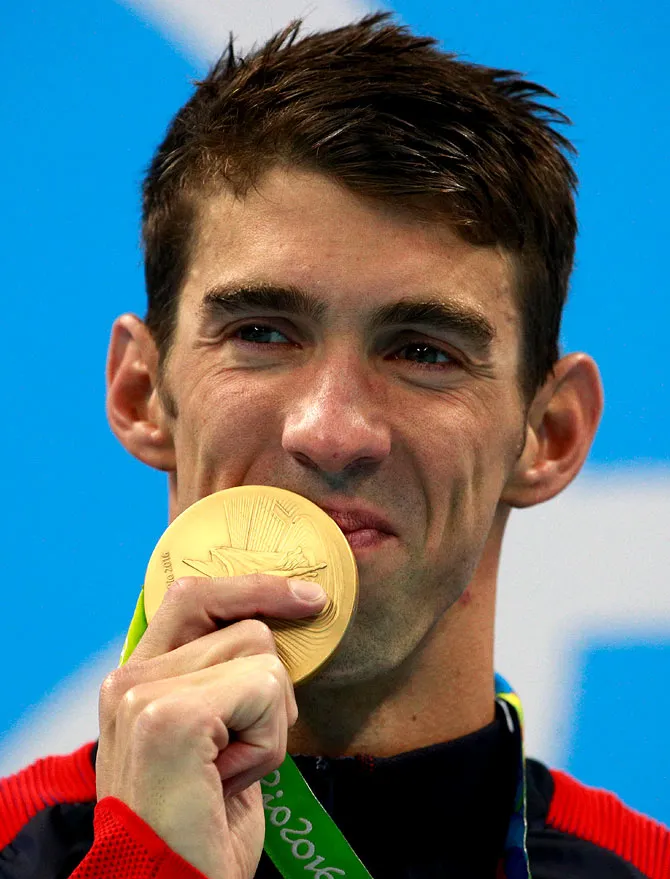
2. Mark Spitz’s Seven Gold Medals
Michael Phelps’ eight gold medals at the 2008 Olympics may be the most talked-about swimming achievement, but Mark Spitz‘s seven gold medals at the 1972 Munich Olympics laid the foundation for future greatness in the sport.
Spitz’s performance wasn’t just remarkable for its quantity; each of his victories set a world record, demonstrating an unparalleled level of excellence. Competing in seven events, Spitz showcased versatility and dominance, excelling in freestyle and butterfly strokes.
His charisma and confidence captivated audiences, making him a household name. You could feel the weight of expectation on his shoulders, yet he thrived under pressure, embodying the spirit of competition.
Moreover, the 1972 Olympics were marked by tragedy, with the Munich massacre overshadowing the games. Spitz became a symbol of resilience, reminding viewers of the power of sport to unite and uplift.
His achievements inspired future swimmers, including Phelps, who’d later break Spitz’s record. In reflecting on Spitz’s legacy, it’s clear that his seven gold medals not only highlighted individual brilliance but also paved the way for generations of athletes to chase their dreams in the pool.
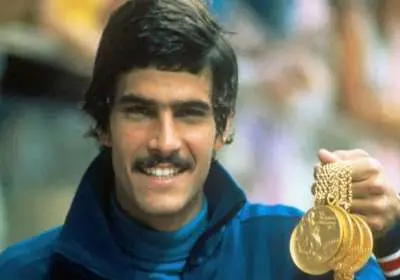
3. Katie Ledecky’s Dominance in Rio
Dominating the pool at the 2016 Rio Olympics, Katie Ledecky showcased her incredible talent and determination, winning four gold medals and rewriting the record books. Her performance wasn’t just about the medals; it was a masterclass in swimming strategy and execution. You witnessed her start strong, maintaining a relentless pace that left competitors trailing behind.
In the 800-meter freestyle, she shattered her own world record, finishing nearly 12 seconds ahead of the silver medalist. This wasn’t merely a win; it was a statement. Ledecky’s ability to push her limits while remaining composed under pressure demonstrated a maturity beyond her years.
Her victories in the 200-meter and 400-meter freestyle events further solidified her dominance. You couldn’t help but admire her technique: the powerful strokes, the seamless turns, and her unwavering focus.
Ledecky’s achievements in Rio didn’t just elevate her status; they also inspired a generation of young female athletes. By breaking barriers, she encouraged many to dream big and pursue their passions.
In a sport that demands discipline and resilience, Ledecky’s legacy in Rio will certainly resonate for years to come.

4. Australia’s Women’s Relay Triumph
Australia’s women’s freestyle relay team delivered a historic performance at the Sydney 2000 Olympics that you won’t forget.
Facing fierce competition from powerhouse teams like Germany and the USA, they showcased remarkable teamwork and tenacity to clinch a last-minute victory.
This thrilling triumph not only highlighted their skill but also captured the excitement of the moment, leaving a lasting impression on Olympic history.
Historic Team Performance
While many individual performances at the Olympics capture our attention, the historic triumph of the Australian women’s freestyle relay team at the 2000 Sydney Games stands out as a defining moment in team competition. This victory wasn’t just about speed; it was a powerful declaration of unity and resilience.
As the race unfolded, you could feel the palpable tension in the air. The Australians entered the final leg trailing behind their rivals, yet something remarkable happened.
With each stroke, the Australian swimmer surged ahead, embodying the spirit of teamwork and determination. Their synchronized efforts highlighted the importance of trust and support, showcasing how individual strengths can amplify collective success. This was more than a race; it represented the power of collaboration and the belief that together, you can achieve the extraordinary.
The sheer joy on their faces as they touched the wall and secured gold was a confirmation of their hard work and dedication. This moment not only etched itself into Olympic history but also served as an inspiration for future generations.
It reminds us that in sports, as in life, teamwork can lead to triumph, creating a legacy that resonates far beyond the pool.
Overcoming Strong Competition
The thrill of competition in swimming often brings out the best in athletes, and the 2000 Sydney Olympics showcased this phenomenon perfectly. Australia’s women’s freestyle relay team faced immense pressure, going up against powerhouse competitors like Germany and the USA. You can feel the tension as these athletes prepared to plunge into the pool, knowing they were the underdogs.
However, what unfolded was nothing short of extraordinary. As the race progressed, it became clear that determination and teamwork would be their greatest assets. Each swimmer played a pivotal role, pushing themselves to their limits.
The iconic moment arrived when anchor swimmer Jodie Henry surged ahead, overtaking rivals in a breathtaking final leg. This triumph wasn’t just a race; it symbolized resilience and unity. By overcoming strong competition, the Australian team not only claimed gold but also inspired countless others.
Their victory highlighted the unpredictable nature of sports, where anything can happen on race day. The sheer joy and disbelief etched on their faces captured the essence of Olympic spirit, reminding us that with hard work and collaboration, you can defy the odds and achieve greatness.
Last-Minute Victory Excitement
Victory excitement reached a fever pitch during the thrilling final moments of the women’s freestyle relay at the 2000 Sydney Olympics. As the race unfolded, you could feel the tension rising—Australia was trailing, and the pressure was palpable.
All eyes were on the final swimmer, anchor Eamon Sullivan, who’d to make up a significant gap against formidable opponents from the USA and Germany.
In those last few strokes, time seemed to freeze. Sullivan’s determination surged, and with each powerful pull, he drew closer to the leaders. The crowd erupted with every inch he gained, reflecting the raw energy of national pride. You couldn’t help but get swept up in the moment, heart racing alongside the athletes.
When Sullivan touched the wall, the result was nothing short of miraculous—first place! That victory wasn’t just a win; it was a demonstration of teamwork, resilience, and the spirit of competition.
Australia’s women had transformed a seemingly bleak outcome into a historic gold medal triumph. This moment encapsulated the essence of Olympic swimming, illustrating how last-minute victories can leave lasting impressions on both athletes and fans alike.
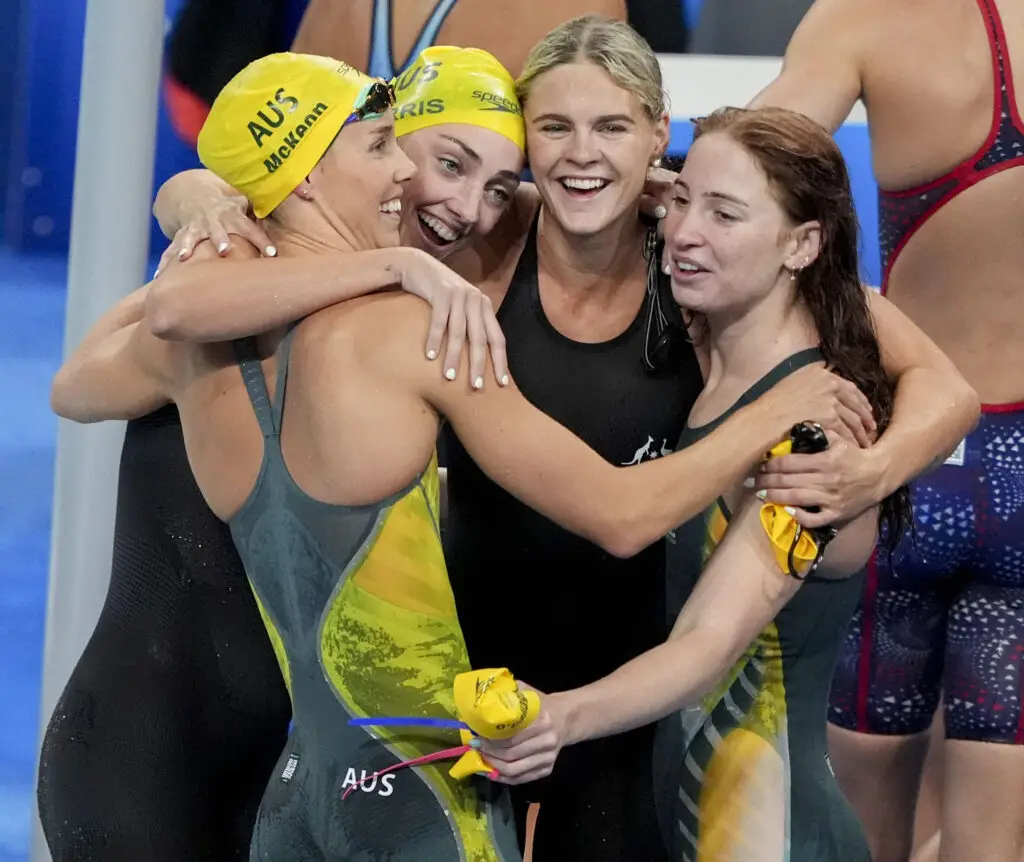
5. Dawn Fraser’s Olympic Legacy
As you explore the legacy of Dawn Fraser, you’ll discover a trailblazer whose impact on Olympic swimming transcends her remarkable achievements in the pool. Winning three consecutive gold medals in the 100m freestyle at the 1956, 1960, and 1964 Olympics, she not only set records but also redefined what it meant to be a female athlete in a male-dominated sport.
Her fierce determination and unwavering spirit inspired countless women to pursue swimming and sports in general.
Fraser’s legacy goes beyond her medals; it embodies a fight for equality. She challenged the norms of her time, advocating for better conditions and opportunities for female swimmers. This advocacy paved the way for future generations, encouraging women to claim their space in competitive swimming.
Moreover, her dramatic personality and passionate approach to racing brought a new level of excitement to the sport, enchanting audiences and media alike.
Dawn Fraser’s legacy is a demonstration of the power of perseverance and the importance of breaking barriers. You can’t help but appreciate how her contributions continue to resonate, reminding us that the pursuit of freedom and equality in sports is an ongoing journey.
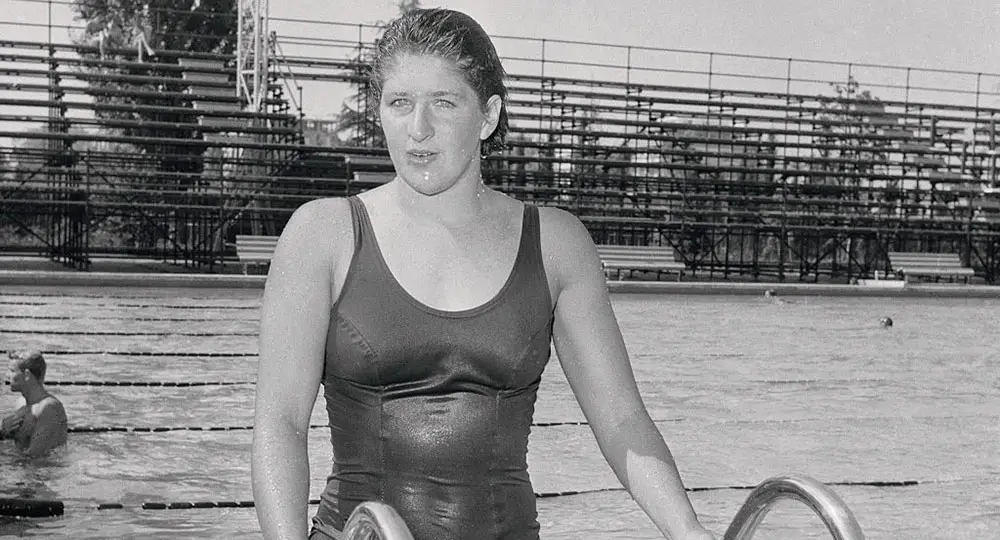
6. The 4x100m Freestyle Upset
When you think of the 4x100m freestyle relay, the unexpected victory often steals the spotlight, showcasing how teamwork can defy odds.
The dynamics of a legendary relay team highlight not just individual talent but also the power of strategy and synergy in racing.
This thrilling upset not only brought jubilation to the underdogs but also left an indelible mark on Olympic history.
Unexpected Victory Celebration
The atmosphere buzzed with anticipation as the final leg of the men’s 4x100m freestyle relay unfolded at the 2008 Beijing Olympics, where fans expected a showdown between the dominant American and Australian teams.
As the race progressed, you could feel the tension—every stroke counted. But then, something unexpected happened. The excitement surrounding the event mirrored the community engagement seen in sports programs, where athletes often inspire local participation through their remarkable performances community sports events.
- A Last-Minute Lead: The French team, led by the charismatic Alain Bernard, surged ahead, defying odds and expectations.
- Jaw-Dropping Finish: Their stunning victory against the heavily favored Americans shocked spectators, as they clinched gold by just a fingertip.
- Unforgettable Celebration: Bernard’s exuberant celebration, complete with a high-energy fist pump, became a symbol of triumph against the odds.
This moment encapsulated the essence of Olympic spirit—where determination and unpredictability intertwine.
The French team didn’t just win; they ignited a celebration of unexpected victories. As they shared their joy, it reminded everyone that in sports, anything is possible.
This upset wasn’t merely a race won; it was a vivid illustration of how courage and teamwork can topple giants.
In the end, the excitement of the upset forged a lasting memory in Olympic swimming history.
Legendary Relay Team Dynamics
In the thrilling world of Olympic swimming, the dynamics of a relay team can make or break a race, and the 4x100m freestyle at the 2008 Beijing Olympics exemplifies this perfectly. As you watch, you can feel the palpable energy and tension as each swimmer dives in, knowing that their performance directly impacts their teammates.
The American team, featuring stars like Phelps and Lochte, faced immense pressure while competing against the heavily favored French squad.
What sets legendary relay teams apart is their seamless communication and trust. Each swimmer must execute their leg with precision, ensuring smooth changes during the handoffs. In this race, the Americans’ ability to remain composed was vital.
When you observe the final leg, you can see the relentless determination as Phelps surged ahead, overtaking the French anchor, who’d a lead.
This upset became a defining moment, highlighting how teamwork, strategy, and individual brilliance intertwine in relay races. You realize that it’s not just about speed; it’s about the unbreakable bond among teammates, pushing each other to achieve greatness together.
In the end, that’s what makes the relay dynamic so compelling and unforgettable.
7. Ryan Lochte’s Comeback Performance
Ryan Lochte’s comeback performance at the 2021 Tokyo Olympics showcased not only his resilience but also the enduring spirit of a seasoned athlete determined to reclaim his place on the global stage.
After facing personal and professional challenges, you witnessed Lochte’s unyielding commitment to his sport, demonstrating that passion can reignite even the fiercest of competitors.
Key highlights of Lochte’s journey include:
- Overcoming Adversity: After setbacks and a hiatus from competitive swimming, he trained rigorously to prove he still had what it takes.
- Mental Fortitude: Lochte exhibited remarkable mental strength, focusing on his goals despite external pressures and criticisms.
- Inspiring Others: His determination served as a beacon for younger swimmers, emphasizing that comebacks are possible with hard work.
Lochte’s performance resonated with fans and critics alike, reminding everyone that the heart of an athlete often beats strongest in the face of adversity.
While he may not have reached the podium this time, his journey is a reflection of the fact that true champions never give up, inspiring all of us to pursue our own comebacks in life.
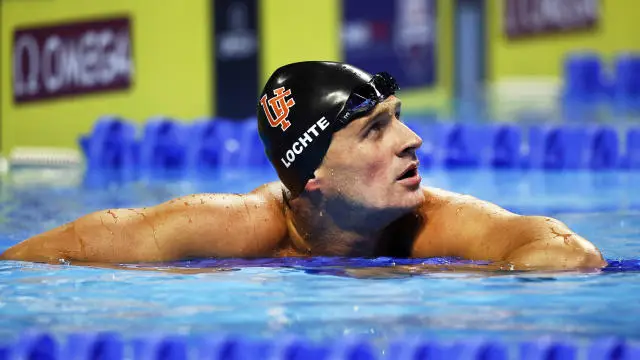
8. The Birth of Women’s Swimming
Emerging from the shadows of male-dominated sports, women’s swimming began to carve its own identity in the early 20th century, gaining momentum as a competitive event in the Olympics. Initially, women faced significant barriers, often relegated to the sidelines or denied the opportunity to compete.
However, in 1912, the Stockholm Olympics marked a pivotal moment, as women’s swimming made its debut, showcasing their talent and grace in the water. The growing interest in sports and recreational activities, as seen in initiatives like the community engagement programs, also played a role in encouraging female participation in swimming.
As you look back, you’ll see that early female swimmers, like American Annette Kellerman, broke stereotypes and paved the way for future generations. Their determination challenged societal norms, inspiring young girls to aspire to greatness in the sport.
By the time the 1936 Berlin Olympics rolled around, women’s swimming had blossomed, with events expanding and female athletes gaining recognition.
This evolution wasn’t just about competition; it symbolized broader societal changes. The emergence of women in swimming reflected a growing movement for gender equality, pushing boundaries and redefining roles.
As you celebrate these trailblazers, remember that their legacy continues to inspire today’s athletes, empowering them to chase their dreams in and out of the pool.
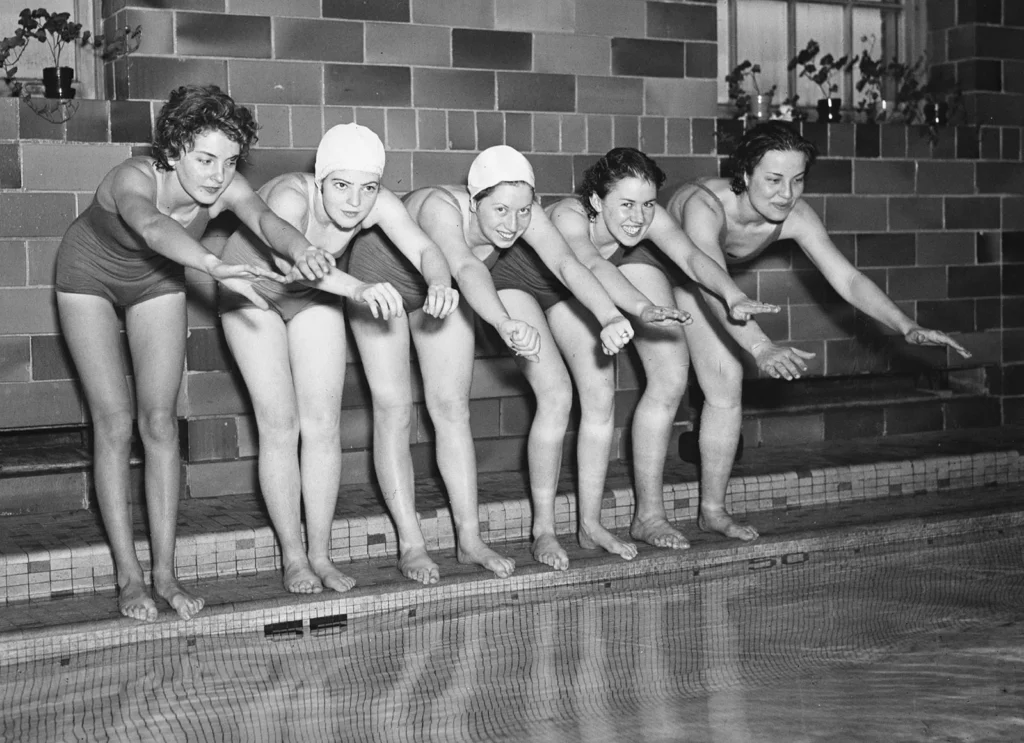
9. Swimming’s Role in Olympic Unity
Swimming at the Olympics isn’t just about individual glory; it’s a powerful display of national pride and unity.
When athletes from different countries compete, they bridge cultural divides, showcasing the shared human spirit that transcends borders.
This unique aspect of the sport fosters camaraderie and respect among nations, making every race a celebration of global togetherness.
National Pride Through Competition
In the world of the Olympics, few sports embody national pride quite like swimming. When you watch swimmers compete, you’re witnessing a powerful blend of individual talent and collective spirit. The thrill of competition transcends borders, uniting nations in celebration of athletic excellence.
Here are three key ways swimming fosters national pride:
- Historical Achievements: Legendary performances, from Mark Spitz to Katie Ledecky, showcase not just talent but also the relentless dedication of athletes who represent their countries on the world stage.
- Team Dynamics: Relay events highlight the camaraderie among teammates. When swimmers join forces, they embody the essence of teamwork, creating a sense of shared national identity that resonates with fans.
- Global Rivalries: The intensity of international competition sparks a sense of unity among citizens. As you cheer for your nation’s swimmers, you’re part of a larger community celebrating collective aspirations and dreams.
Through each stroke, Olympic swimmers not only chase personal glory but also carry the hopes of their nations. This unique synergy of individual and national achievement makes swimming a profound symbol of pride and unity in the Olympics.
Bridging Cultural Divides
The Olympic Games serve as a powerful platform for bridging cultural divides, and swimming plays an essential role in this unifying experience. When you watch swimmers from diverse backgrounds compete, you witness not just athletic prowess but also a celebration of global unity. Each stroke in the pool tells a story of dedication and resilience, transcending geographical and cultural barriers.
Take, for instance, the camaraderie displayed during relay races—athletes from different nations often share a genuine respect for one another, regardless of their competitive instincts. This shared passion for the sport fosters connections that can lead to lasting friendships.
Additionally, swimming events showcase the beauty of diversity; you’ll find athletes of various ethnicities and backgrounds, all aspiring for excellence.
As swimmers break records and earn medals, they inspire countless individuals worldwide. Their achievements remind us that the human spirit knows no bounds.
The Olympics, through swimming, creates a unique environment where cultural divides diminish, and shared values of determination and teamwork shine. In this way, swimming not only entertains but also enriches our understanding of unity in diversity, reminding us that we all share the same aspirations for greatness.
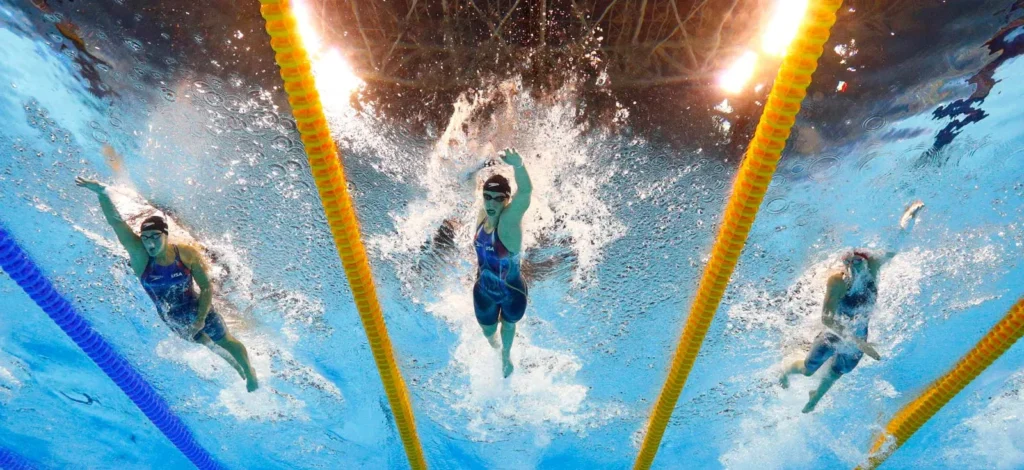
10. The Magnificent Seven in Munich
Often regarded as one of the most remarkable feats in Olympic history, the performance of the American swimming team at the 1972 Munich Olympics is a demonstration of both individual excellence and collective strength.
The games were marked by the extraordinary achievements of Mark Spitz, who made headlines with his historic seven gold medals.
Here are three key points highlighting this iconic moment:
- Unmatched Dominance: Spitz won all seven events he entered, setting world records in each. His remarkable speed and precision showcased the pinnacle of competitive swimming.
- Symbol of Resilience: The backdrop of the Munich Games was marred by tragedy, yet Spitz’s triumph became a beacon of hope and resilience for Team USA, uniting the nation during a difficult time.
- Cultural Impact: Spitz’s success popularized swimming and inspired a generation of athletes, proving that excellence in sport can transcend personal achievement to foster national pride.
This historic performance not only solidified Spitz’s legacy but also underscored the significance of teamwork and determination in the face of adversity, enthralling audiences and leaving an indelible mark on Olympic history.
11. Usain Bolt’s Influence on Swimming
Usain Bolt’s remarkable achievements on the track have inspired swimmers to push their boundaries and showcase their own athletic excellence.
You can see how his charisma and record-breaking performances have shifted the spotlight onto swimming, motivating athletes to elevate their game.
As the worlds of sprinting and swimming intertwine, the influence of Bolt serves as a powerful reminder of the dedication and passion required to excel in any sport.
Cross-Sport Inspiration
Many athletes across various sports find inspiration in the achievements of their peers, and few have had as profound an influence on the world of sports as Usain Bolt.
His extraordinary success has sparked a wave of motivation among swimmers, merging track and field’s speed with swimming’s grace.
Here’s how Bolt’s legacy resonates in the aquatic world:
- Work Ethic: Bolt’s relentless commitment to training encourages swimmers to push their limits, embodying the idea that greatness requires hard work.
- Mental Resilience: His ability to perform under pressure reminds swimmers that mental fortitude is just as critical as physical skill.
- Showmanship: Bolt’s charismatic presence on and off the track teaches swimmers the value of engaging with fans, elevating the sport’s profile.
Showcasing Athletic Excellence
Athletic excellence isn’t just about individual achievement; it’s about the influence one athlete can have across disciplines. Usain Bolt, the iconic sprinter, has left an indelible mark on swimming by inspiring athletes with his unmatched charisma and work ethic. His electrifying performances in track and field showcased not just speed, but the sheer joy of competition, encouraging swimmers to embrace their own journeys with the same passion.
You might wonder how a sprinter can impact swimming. Bolt’s emphasis on mental toughness and the importance of showmanship has resonated with swimmers like Katie Ledecky and Caeleb Dressel. They’ve adopted his mantra of enjoying the moment, which translates to more exhilarating performances in the pool.
Moreover, Bolt’s global appeal has raised awareness for all Olympic sports, including swimming. His ability to capture the audience’s attention has paved the way for swimmers to receive similar recognition, leading to increased sponsorship and support for the sport.
Ultimately, Bolt’s influence underscores a universal truth: excellence transcends individual sports. It inspires athletes across disciplines to endeavor for greatness while fostering a collective spirit that elevates the Olympic experience for all.
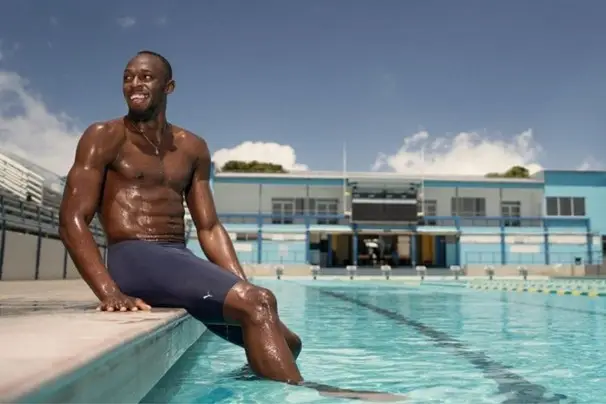
12. The Rise of Japanese Swimmers
Japanese swimmers have surged onto the Olympic stage in recent years, showcasing their talent and determination in an increasingly competitive field. This rise isn’t just a fluke; it reflects years of investment in training and a cultural emphasis on discipline and excellence.
Here are three standout elements of this phenomenon:
- Youth Development Programs: Japan’s emphasis on nurturing young talent through robust training programs has produced exceptional athletes who excel on the global stage.
- Record-Breaking Performances: Swimmers like Daiya Seto and Yui Ohashi have consistently shattered national and international records, proving that Japanese athletes can compete with the world’s best.
- Increased Visibility: The growing media coverage of swimming events in Japan hasn’t only inspired new generations but also fostered a sense of national pride and support for these athletes.
As the world looks to the future, Japan’s swimmers are likely to continue making waves in the Olympics.
With their relentless drive, strategic training, and vibrant team spirit, they’re set to redefine what it means to be a champion in swimming, capturing hearts and admiration worldwide.
13. South African Swimmers Break Barriers
South African swimmers have emerged as formidable competitors on the Olympic stage, breaking barriers and challenging stereotypes in a sport traditionally dominated by a few nations. Their rise showcases the power of determination and talent, proving that excellence knows no geographical bounds.
Swimmers like Chad le Clos and Penny Heyns haven’t only won medals but also inspired a generation of athletes back home.
Chad le Clos, in particular, made waves during the 2012 London Olympics when he upset the legendary Michael Phelps in the 200-meter butterfly. This victory wasn’t just personal; it represented a significant moment for South Africa, demonstrating that athletes from diverse backgrounds could excel on the world stage.
Similarly, Penny Heyns became a trailblazer in the 1990s by winning gold in both the 100 and 200-meter breaststroke events in Atlanta 1996, making her the first woman to achieve such a feat.
These athletes have helped reshape global perceptions of South African swimmers, fostering a newfound respect and interest in the sport within their country. Their journeys remind us that barriers can be broken and that every swimmer has a place in Olympic history.
14. The 2000 Sydney Olympics Highlights
At the 2000 Sydney Olympics, swimming captivated audiences with thrilling performances that showcased both individual brilliance and remarkable teamwork. This event was a defining moment in Olympic history, where unforgettable highlights included:
- Australia’s Women’s Freestyle Relay Victory: The Australian team pulled off a dramatic come-from-behind win, defeating powerhouse squads from Germany and the USA, illustrating the power of teamwork and strategy.
- Ian Thorpe’s Dominance: Known as “Thorpedo,” Ian Thorpe won three gold medals in the 400m, 200m, and 4x100m freestyle events, showcasing his unmatched speed and grace in the water.
- The Rise of Young Athletes: The Games highlighted emerging talents, including the 15-year-old American swimmer, who demonstrated that age doesn’t dictate success, inspiring a new generation of swimmers.
These moments not only celebrated athletic excellence but also emphasized the spirit of competition and camaraderie.
The 2000 Sydney Olympics reinforced swimming’s status as a cornerstone of the Games, where personal and national triumphs resonated with millions, leaving a lasting legacy that continues to inspire.
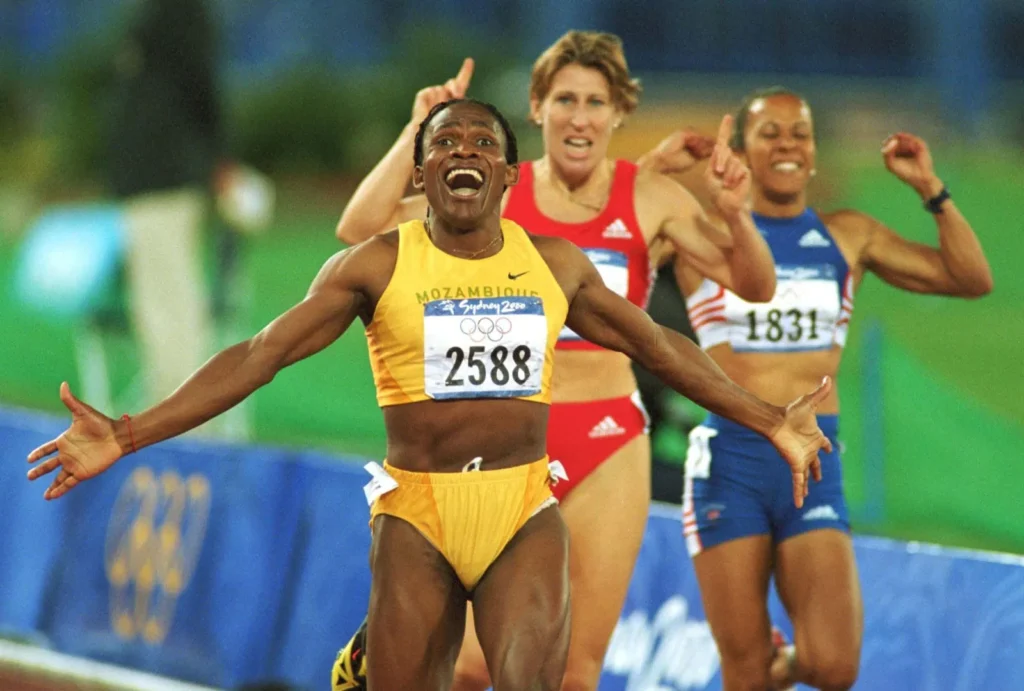
Record-Breaking Performances Through Decades
Swimming has consistently delivered record-breaking performances that not only redefine the limits of human potential but also capture the imagination of fans across the globe. Through the decades, swimmers have pushed boundaries, showcasing their extraordinary skills and mental fortitude.
Take Michael Phelps, for instance. His historic eight gold medals at the 2008 Beijing Olympics didn’t just break records; they established a new standard in competitive swimming.
Similarly, Mark Spitz‘s seven golds in Munich ’72 not only marked his supremacy but also resonated deeply during a turbulent time in history.
Fast forward to the modern era, and we see young talents like Katie Ledecky emerging. At just 15, she claimed four golds and set two world records in Rio 2016, demonstrating the evolving nature of the sport and inspiring future generations.
Relay races amplify this excitement, as teams embody unity and strategy. The Australian women’s freestyle relay team in Sydney 2000 is a perfect example of how collective effort can lead to monumental victories.
These performances remind us that swimming isn’t just about speed; it’s about passion, perseverance, and breaking through limitations.
Conclusion
As you reflect on these iconic Olympic swimming moments, picture the splash of water, the cheers of a nation, and the sheer determination etched on each athlete’s face. From Phelps slicing through the waves to Ledecky’s relentless pace, these stories of triumph and resilience resonate deeply, uniting us in admiration. Swimming isn’t just about medals; it’s about dreams realized under the spotlight, inspiring future generations to embark on their own journeys, fueled by passion and perseverance.